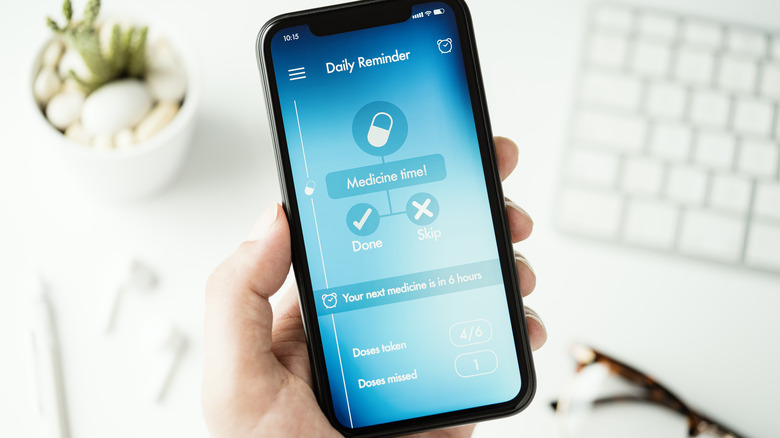What To Do If You Can't Remember If You Took Your Medication
Taking your prescribed medications as directed by your healthcare professional is vital for maintaining good health and managing chronic conditions. Sticking to the prescribed regimen is crucial, whether it's antibiotics for an infection or daily prescriptions for a chronic illness. But if you struggle with doing so, you're not alone. A 2012 study published in Public Health Reports states that 75% of Americans find it challenging to take their medications as directed.
Remembering to take medication can be challenging, especially if you take multiple medications or have memory issues. It's natural to feel anxious and worried about accidentally missing a dose or taking too much medication.
Healthcare professionals suggest a cautious approach when in doubt. Overdosing on medication can lead to serious and life-threatening side effects (per the California State Board of Pharmacy). However, what you should do will vary depending on the medication and how late you are in taking it. Sometimes it's better to skip the dose, while in other cases, it's better to go ahead and take it. A medical professional can help you determine the best course of action for your specific situation, so consult with your doctor or pharmacist or refer to the patient information sheet that you received with your prescription to be safe.
The importance of medication adherence
Your health and well-being are important, so taking your prescribed medication as directed is crucial. According to a 2022 study published in the Journal of Managed Care + Specialty Pharmacy, medication nonadherence contributes to 125,000 deaths and 10% of hospitalizations every year in the United States. Consistently adhering to your medication regimen increases your chances of benefiting from the drug's therapeutic effect. This can lead to a speedy recovery from illnesses, better management of chronic conditions, and improved overall treatment efficacy. It also helps you avoid frequent doctor visits, emergency room visits, and hospitalizations, which can be a financial burden and increase stress and anxiety.
For medications prescribed to treat infections or diseases, such as antibiotics, following the instructions on taking the medication is crucial. Inconsistent adherence can contribute to developing drug resistance, making the medication less effective in the future. Drugs are designed to work systematically and consistently, and taking your medicine as directed is the best way to ensure they do their job correctly. Consistent adherence to your medication regimen and open communication with your healthcare provider allows you to control your health and well-being.
Strategies to help you remember to take medication
Helpful strategies can help you remember to take your medication as prescribed. Pill organizers (or pill boxes) are handy tools that make it easy to see if you've taken your meds for the day. Setting alarms or reminders is a powerful tool to ensure you don't forget your medication. You can schedule alarms on your phone or try a medication reminder app that lets you input your medication schedule, receive reminders, and even track your adherence over time. Linking your medicines to a daily routine, like brushing your teeth in the morning or getting ready for bed, also helps you become less likely to forget (per Yahoo!).
Consider involving a trusted caregiver or family member to help make sure you're taking your doses as prescribed. You can also create a visual chart or checklist to track your medications and cross off each dose as you take it. Remember, consistency is key when it comes to taking your medications as prescribed. Choose the strategies that work best for you, and don't be afraid to communicate openly with your healthcare provider about any challenges you face.



